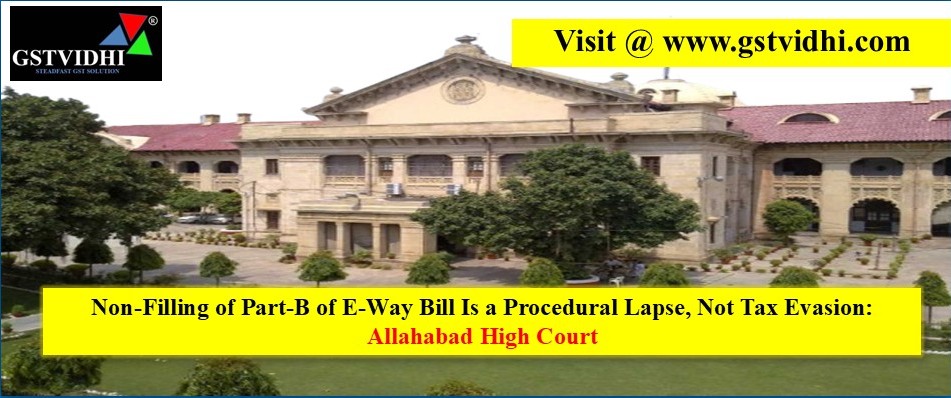
Non-Filling of Part-B of E-Way Bill Is a Procedural Lapse, Not
Tax Evasion: Allahabad High Court
Introduction
In a significant judgment
protecting genuine taxpayers from harsh penal consequences due to procedural
errors, the Allahabad High Court has quashed a penalty order passed
under Section 129(3) of the U.P. GST Act, 2017. The case titled M/s
Auto Industries v. State of U.P. and Another (Writ Tax No. 2457 of 2025)
involved the non-filling of Part-B of the e-way bill, which the
authorities treated as a violation warranting seizure and penalty.
The Court held that in
the absence of any finding on tax evasion, mere non-filling of Part-B
constitutes a technical breach and cannot attract penalty under
Section 129, citing its consistent view in similar cases.
Case Details
- Case Title:
M/s Auto Industries v. State of U.P. and Another
- Case Number:
Writ Tax No. 2457 of 2025
- Court:
High Court of Judicature at Allahabad (Chief Justice's Court)
- Order Date:
29 May 2025
Background
of the Case
The petitioner, M/s
Auto Industries, was transporting goods through the state of Uttar Pradesh
when the vehicle was intercepted at Jewar Toll by the Mobile Squad. The
vehicle was accompanied by an e-way bill; however, Part-B of the e-way bill
(containing transport details) was found to be unfilled.
The Assistant
Commissioner, Sector 5 (Mobile Squad 5), Gautam Buddha Nagar, issued a notice
and later passed an order dated 13 May 2025, imposing a penalty under
Section 129(3) of the UP GST Act solely on the ground of non-compliance
with Rule 138 of the GST Rules, 2017.
Arguments
by the Petitioner
- The petitioner submitted that non-filling
of Part-B was a technical lapse and not an intentional act
to evade tax.
- It was argued that the authority
did not record any finding indicating an attempt to evade tax, which
is a mandatory precondition for invoking Section 129.
- Reliance was placed on the precedent
set by the Allahabad High Court in M/s Precision Tools India v. State
of U.P. & Others, Writ Tax No. 415 of 2023, decided on 29
January 2024, where it was held that penalty cannot be imposed
unless intention to evade tax is established.
Stand of
the Respondent
- The State's counsel admitted the non-filling
of Part-B but defended the imposition of penalty on the basis that the
required documents were incomplete, making the movement
non-compliant.
- However, the State could not deny
that the High Court had consistently held in prior rulings that absence
of tax evasion intent negates the need for penalty under Section 129.
Observations
of the Court
The Division Bench of the
High Court made the following key observations:
1. The
only ground cited in the penalty order was the violation of Rule 138
due to non-filling of Part-B of the e-way bill.
2. No
specific finding was made by the Assistant Commissioner
about any attempt to evade tax.
3. Referring
to a consistent line of judgments, including Precision Tools India,
the Court reiterated that mere procedural infractions do not justify
penal actions without evidence of tax evasion.
Judgment
Based on the above
findings, the High Court passed the following directions:
- The penalty order dated 13.05.2025
passed by the Assistant Commissioner, Sector 5 (Mobile Squad 5), Gautam
Buddha Nagar is set aside.
- The writ petition is allowed.
- The vehicle and goods detained
are to be released immediately to the petitioner.
Conclusion
The Allahabad High
Court’s judgment in M/s Auto Industries is a welcome reiteration that procedural
non-compliance should not lead to punitive consequences in the absence
of tax evasion. It offers clarity and comfort to taxpayers engaged in bona
fide business activities and underscores the need for balanced GST
enforcement that upholds both the letter and spirit of the law.
Disclaimer: All the Information is based on the notification, circular advisory and order issued by the Govt. authority and judgement delivered by the court or the authority information is strictly for educational purposes and on the basis of our best understanding of laws & not binding on anyone.
Find the Attachment (Press on Click Here )
Click here